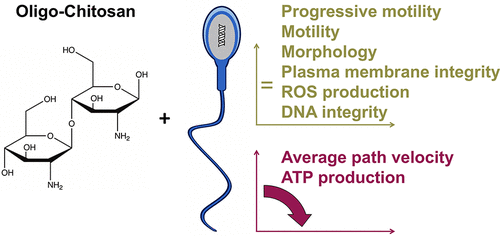当前位置:
X-MOL 学术
›
ACS Appl. Mater. Interfaces
›
论文详情
Our official English website, www.x-mol.net, welcomes your
feedback! (Note: you will need to create a separate account there.)
Assessment of Oligo-Chitosan Biocompatibility toward Human Spermatozoa.
ACS Applied Materials & Interfaces ( IF 8.3 ) Pub Date : 2019-12-09 , DOI: 10.1021/acsami.9b17605 Ulrike Schimpf 1 , Gilai Nachmann 1 , Stephane Trombotto 2 , Petr Houska 3 , Hongji Yan 1 , Lars Björndahl 3 , Thomas Crouzier 1
ACS Applied Materials & Interfaces ( IF 8.3 ) Pub Date : 2019-12-09 , DOI: 10.1021/acsami.9b17605 Ulrike Schimpf 1 , Gilai Nachmann 1 , Stephane Trombotto 2 , Petr Houska 3 , Hongji Yan 1 , Lars Björndahl 3 , Thomas Crouzier 1
Affiliation

|
The many interesting properties of chitosan polysaccharides have prompted their extensive use as biomaterial building blocks, for instance as antimicrobial coatings, tissue engineering scaffolds, and drug delivery vehicles. The translation of these chitosan-based systems to the clinic still requires a deeper understanding of their safety profiles. For instance, the widespread claim that chitosans are spermicidal is supported by little to no data. Herein, we thoroughly investigate whether chitosan oligomer (CO) molecules can impact the functional and structural features of human spermatozoa. By using a large number of primary sperm cell samples and by isolating the effect of chitosan from the effect of sperm dissolution buffer, we provide the first realistic and complete picture of the effect of chitosans on sperms. We found that CO binds to cell surfaces or/and is internalized by cells and affected the average path velocity of the spermatozoa, in a dose-dependent manner. However, CO did not affect the progressive motility, motility, or sperm morphology, nor did it cause loss of plasma membrane integrity, reactive oxygen species production, or DNA damage. A decrease in spermatozoa adenosine triphosphate levels, which was especially significant at higher CO concentrations, points to possible interference of CO with mitochondrial functions or the glycolysis processes. With this first complete and in-depth look at the spermicidal activities of chitosans, we complement the complex picture of the safety profile of chitosans and inform on further use of chitosans in biomedical applications.
中文翻译:

寡壳聚糖对人类精子生物相容性的评估。
壳聚糖多糖的许多有趣特性已促使其广泛用作生物材料的组成部分,例如,用作抗菌涂层,组织工程支架和药物递送载体。这些基于壳聚糖的系统向临床的转化仍然需要对其安全性概况有更深入的了解。例如,关于壳聚糖是杀精虫剂的普遍说法很少或没有数据支持。在本文中,我们彻底研究了壳聚糖低聚物(CO)分子是否会影响人类精子的功能和结构特征。通过使用大量的原始精子细胞样品,并从精子溶解缓冲液的作用中分离出壳聚糖的作用,我们提供了壳聚糖对精子作用的第一张真实而完整的图片。我们发现CO结合到细胞表面或/和被细胞内在化并以剂量依赖的方式影响精子的平均路径速度。但是,CO不会影响进行性运动,运动或精子形态,也不会引起质膜完整性,活性氧产生或DNA损伤。精子三磷酸腺苷水平的降低(在较高的CO浓度下尤为明显)表明,CO可能干扰线粒体功能或糖酵解过程。通过对壳聚糖的杀精活性的首次完整而深入的了解,我们补充了壳聚糖安全性概况的复杂情况,并为壳聚糖在生物医学应用中的进一步使用提供了信息。
更新日期:2019-12-11
中文翻译:

寡壳聚糖对人类精子生物相容性的评估。
壳聚糖多糖的许多有趣特性已促使其广泛用作生物材料的组成部分,例如,用作抗菌涂层,组织工程支架和药物递送载体。这些基于壳聚糖的系统向临床的转化仍然需要对其安全性概况有更深入的了解。例如,关于壳聚糖是杀精虫剂的普遍说法很少或没有数据支持。在本文中,我们彻底研究了壳聚糖低聚物(CO)分子是否会影响人类精子的功能和结构特征。通过使用大量的原始精子细胞样品,并从精子溶解缓冲液的作用中分离出壳聚糖的作用,我们提供了壳聚糖对精子作用的第一张真实而完整的图片。我们发现CO结合到细胞表面或/和被细胞内在化并以剂量依赖的方式影响精子的平均路径速度。但是,CO不会影响进行性运动,运动或精子形态,也不会引起质膜完整性,活性氧产生或DNA损伤。精子三磷酸腺苷水平的降低(在较高的CO浓度下尤为明显)表明,CO可能干扰线粒体功能或糖酵解过程。通过对壳聚糖的杀精活性的首次完整而深入的了解,我们补充了壳聚糖安全性概况的复杂情况,并为壳聚糖在生物医学应用中的进一步使用提供了信息。




















































 京公网安备 11010802027423号
京公网安备 11010802027423号